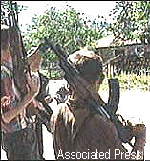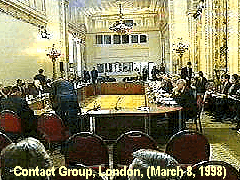


U.S. envoy says Kosovo crisis nears 'general war'
Legitimate role for KLA in Kosovo peace
(June 27, 1998)

 
U.S. envoy says Kosovo crisis nears 'general war' Legitimate role for KLA in Kosovo peace (June 27, 1998) |

|
|
Balkan Institute calls for U.S. initiative on Kosovo March 5, 1998 Contact: James Hooper or Steve Walker Phone: 202-737-5219 WASHINGTON - The Executive Committee of the Balkan Institute issued a statement today calling on the Clinton administration to reiterate its warning to Belgrade that massacres in Kosovo will prompt U.S. military intervention. Executive Committee members also urged that a NATO observer mission be deployed to Kosovo, a special presidential envoy be appointed to manage the Kosovo issue, and comprehensive financial sanctions be reimposed on Belgrade. "The time to act is now, before large-scale violence makes any settlement impossible," said Ambassador Morton Abramowitz, a member of the Balkan Institute's Executive Committee. "We missed our opportunity to prevent the war in Bosnia, and we and the Bosnians have paid the price. Leaving the issue 'to the parties,' as the Pentagon wants, is a formula for violence." Jeane Kirkpatrick, former U.S. Permanent Representative to the United Nations and also a member of the Council's Executive Committee, emphasized, "At some point we need to confront the realities of the Milosevic regime in Serbia and its program of ethnic hatred and violence. In Kosovo, the consequences of Milosevic's persecution of the Kosovar Albanian majority could be devastating if we ignore it. And the longer we wait, the higher the price of our inevitable involvement." Balkan Institute is dedicated to promoting peace, stability, and democracy in the Balkans. Members of the Institute's Executive Committee signing the statement include Morton Abramowitz, Zbigniew Brzezinski, Frank Carlucci, Jeane Kirkpatrick, and William Howard Taft.
The Balkan Institute Executive Committee statement follows:
|
|
First Measures against Belgrade
Contact Group Adopts a Range of Measures against Belgrade over Kosova Crackdown  The foreign ministers of the six-nation Contact Group met for several hours Monday, March 9, 1998, in London to discuss the extremely tense situation in Kosova following the Serbian crackdown on Albanian villages in the Drenica region this past week. The meeting lasted for a couple of hours longer than expected. Following is a statement on Kosovo issued on Monday by foreign ministers from the United States, Russia, Britain, France, Germany and Italy. |
|
1. We the foreign ministers of Contact Group countries, together with representatives of the European Commission and the Office of the High Representative, met in London on 9 March to discuss the increasingly tense situation in Kosovo, Federal Republic of Yugoslavia (FRY), and the unacceptable use of force over recent days. The Balkans region has seen too much bloodshed in recent years for the international community to stand aside. 2. We recalled that when we met in New York on 24 September, 1997, we voiced deep concern over developments in Kosovo and called on the authorities in Belgrade and the leadership of the Kosovar Albanian community to join in a peaceful dialogue. We are dismayed that in the period since September, rather than taking steps to reduce tensions or to enter without preconditions into dialogue toward a political solution, the Belgrade authorities have applied repressive measures in Kosovo. We note with particular concern the recent violence in Kosovo resulting in at least 80 fatalities and condemn the use of excessive force by Serbian police against civilians, and against peaceful demonstrators in Pristina on 2 March. 3. Our condemnation of the actions of the Serbian police should not in any way be mistaken for an endorsement of terrorism. Our position on this is clear. We wholly condemn terrorist actions by the Kosovo Liberation Army or any other group or individual. Those in the Kosovar Albanian community who speak for the different political constituencies should make it clear that they, too, abhor terrorism. We insist likewise that those outside the FRY who are supplying finance, arms or training for terrorist activity in Kosovo should immediately cease doing so. 4. We condemn the large-scare police actions of the last 10 days that further inflamed an already volatile situation. The violent repression of non-violent expression of political views in completely indefensible. We call upon the authorities in Belgrade to invite independent forensic experts to investigate the very serious allegations of extrajudicial killings. If those accusations are borne out, we expect FRY authorities to prosecute and punish those responsible. 5. Our commitment to human rights values means that we cannot ignore such disproportionate methods of control. Government authorities have a special responsibility to protect the human and civil rights of all citizens and to ensure that public security forces act judiciously and with restraint. 6. In the light of the deplorable violence in Kosovo, we feel compelled to take steps to demonstrate to the authorities in Belgrade that they cannot defy international standards without facing severe consequences. The Contact Group has decided to take a broad range of action to address the current situation on an urgent basis. The Contact Group welcomes the continuation of consultations in the United Nations Security Council, in view of the implications of the situation in Kosovo for regional security. Against that background, the Contact Group:
7. At the same time, it is not enough for the killing to stop; too much damage has already been done to human life and to the FRY's credibility. Because of the gravity of the situation, we endorse the following measures to be pursued immediately: a) U.N. Security Council consideration of a comprehensive arms embargo against the FRY, including Kosovo; b) refusal to supply equipment to the FRY which might be used for internal repression, or for terrorism; c) denial of visas for senior FRY and Serbian representatives responsible for repressive action by FRY security forces in Kosovo; d) a moratorium on government financed export credit support for trade and investment, including government financing for privatisations, in Serbia. The Contact Group notes that the Russian Federation cannot support measures c) and d) above for immediate imposition. But if there is no progress towards the steps called for the Contact Group, the Russian Federation will then be willing to discuss all the above measures. We call upon President (Slobodan) Milosevic to take rapid and effective steps to stop the violence and engage in a commitment to find a political solution to the issue of Kosovo through dialogue. Specifically, he should within 10 days:
The Contact Group has decided to meet again on 25 March to assess the response of the government of the FRY. 8. Belgrade's own actions have seriously set back the process of normalisation of the FRY's relations with the international community. Unless the FRY takes steps to resolve the serious political and human rights issues in Kosovo, there is no prospect of any improvement in its international standing. On the other hand, concrete progress to resolve the serious political and human rights issues in Kosovo will improve the international position of the FRY and prospects for normalisation of its international relationships and full rehabilitation in international institutions. 9. No one should misunderstand our position on the core issue involved. We support neither independence nor the maintenance of the status quo. As we have set out clearly, the principles for a solution of the Kosovo problem should be based on the territorial integrity of the Federal Republic of Yugoslavia, and be in accordance with OSCE standards, Helsinki principles, and the U.N. Charter. Such a solution also must take into account the rights of the Kosovo Albanians and all those who live in Kosovo. We support an enhanced status for Kosovo within the FRY which a substantially greater degree of autonomy would bring and recognise that this must include meaningful self-administration. 10. The way to defeat terrorism in Kosovo is for Belgrade to offer the Kosovar Albanian community a genuine political process. The authorities in Belgrade and the leadership of the Kosovar Albanian community must assume their responsibility to enter without preconditions into a meaningful dialogue on political status issues. The Contact Group stands ready to facilitate such a dialogue. |